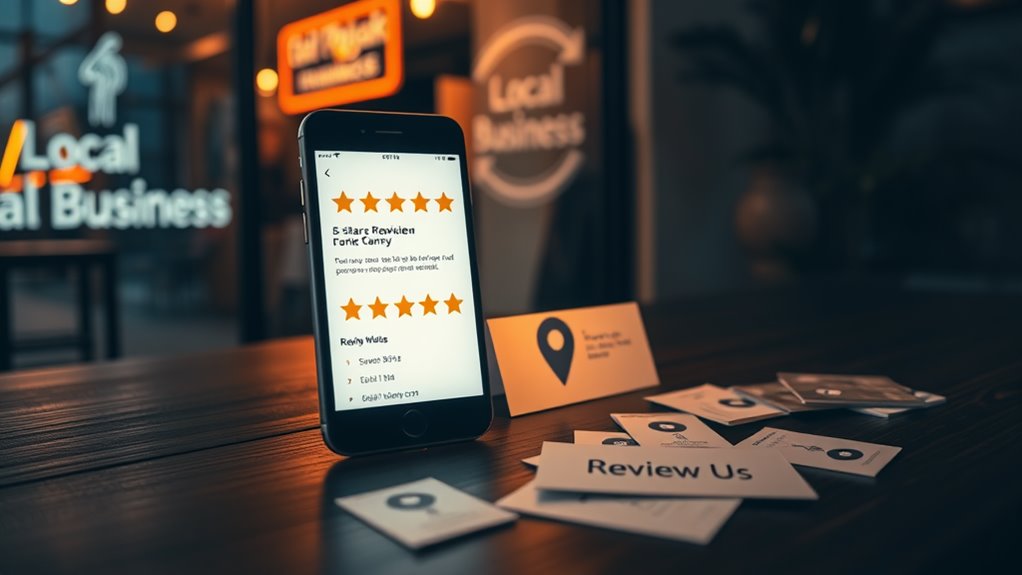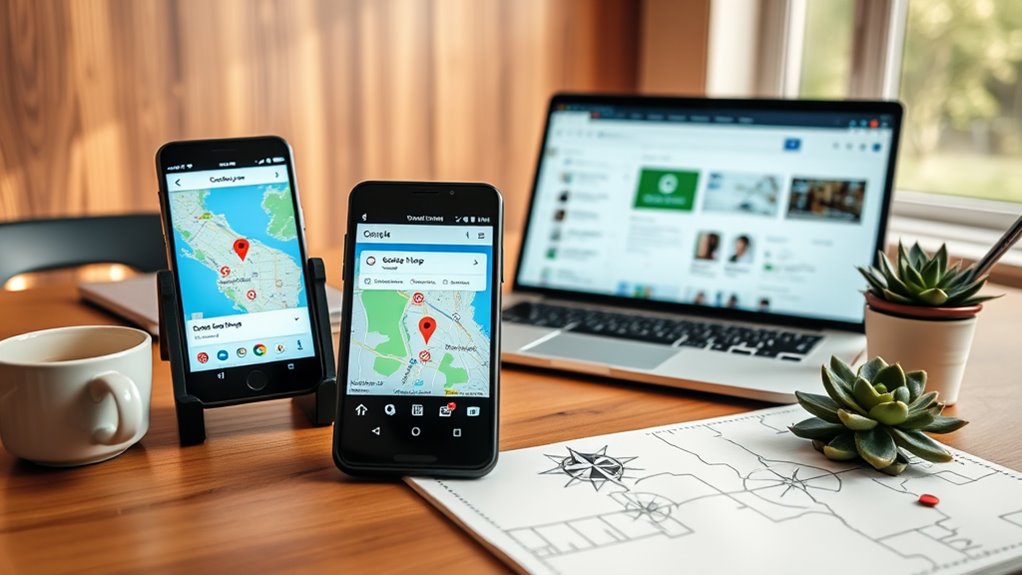To kickstart your local SEO efforts, you'll need to establish a strong digital foundation by creating and optimizing your Google Business Profile, which acts as your online storefront. Focus on optimizing your website with location-specific keywords, incorporating them naturally into your titles, headers, and content while maintaining consistent NAP (Name, Address, Phone) information across all pages. Building local citations, gathering customer reviews, and developing relationships with local businesses for quality backlinks will strengthen your local presence. Implementing these fundamental strategies will position your business effectively in local search results, but there's much more to explore in maximizing your local visibility.
Key Takeaway
- Create and verify a Google Business Profile to establish your local online presence and appear in Google Maps searches.
- Optimize your website with location-specific keywords in titles, headings, and content while maintaining consistent NAP information.
- Encourage satisfied customers to leave Google reviews and respond professionally to all feedback to build local credibility.
- Build citations by listing your business consistently across local directories and industry-specific platforms.
- Develop partnerships with local businesses and organizations to earn authentic backlinks that boost local search visibility.
Create Your Google Business Profile
A Google Business Profile serves as the foundation of any local SEO strategy. Your profile acts as your business's digital storefront, allowing potential customers to find essential information about your company when they search online.
Creating Your Profile:
- Visit business.google.com and sign in with your Google account
- Enter your business name and category
- Add your physical location or service area
- Input contact information, including phone number and website
- Verify your business through Google's verification process
Key Optimization Steps:
- Upload high-quality photos of your business, products, and team
- Write a compelling business description using relevant keywords
- List your complete service offerings and products
- Add your business hours, including holiday schedules
- Monitor and respond to customer reviews
To maximize your profile's effectiveness:
- Update your information regularly (at least quarterly)
- Post updates about promotions, events, and news
- Include attributes that make your business unique
- Add specific services or menu items
- Use the Q&A feature to address common customer inquiries
Remember to maintain consistency between your Google Business Profile information and your website details to build trust with both customers and search engines.
Optimize Your Website Content
Website content optimization forms the backbone of successful local SEO efforts. You'll need to strategically incorporate location-specific keywords and relevant content throughout your site to boost local visibility.
Key Elements to Optimize:
- Homepage Title Tag: Include your primary service and location (e.g., "Premier Dental Care | Family Dentist in Phoenix, AZ")
- Meta Descriptions: Write unique descriptions for each page, featuring location terms and main services
- Header Tags: Structure content with H1-H6 tags, incorporating local keywords naturally
- Content Body: Create location-specific pages for each service area you target
Local Content Best Practices:
- Write detailed service pages with location-specific information
- Include your complete NAP (Name, Address, Phone) on every page
- Add an embedded Google Map on your contact page
- Create local-focused blog posts about community events or area-specific topics
- Use schema markup to help search engines understand your local business data
Remember to maintain a natural flow while incorporating location terms. Don't overstuff content with keywords – aim for a density of 1-2% to keep your content reader-friendly while still appealing to search engines.
Get More Customer Reviews

Customer reviews serve as powerful social proof for your local business while considerably impacting your local search rankings. Google's algorithm takes into account the quantity, quality, and recency of your reviews when determining local search placement.
Key Strategies to Generate More Reviews:
- Create a dedicated review link for your Google Business Profile and share it directly with customers
- Send follow-up emails within 24-48 hours after service completion, including your review link
- Train your staff to naturally request reviews during positive customer interactions
- Implement an automated review management system to streamline the process
Best Practices for Review Management:
- Respond to all reviews, both positive and negative, within 24 hours
- Keep your responses professional and solution-focused
- Include keywords naturally in your review responses
- Monitor review platforms daily (Google, Yelp, industry-specific sites)
Build Local Citations
Local citations form the digital footprint of your business across the internet, consisting of your business name, address, and phone number (NAP) listings on various online platforms. These citations greatly impact your local search rankings, with research showing that businesses with consistent citations across multiple platforms rank 25% higher in local search results.
To build a strong citation profile, you'll need to focus on three key areas:
- Primary Citation Sources
- Google Business Profile
- Bing Places for Business
- Apple Maps
- Industry-Specific Directories
- Professional associations
- Trade organizations
- Local chambers of commerce
- Local Business Directories
- Yelp
- Yellow Pages
- BBB (Better Business Bureau)
When building citations, maintain absolute consistency in your NAP information across all platforms. You'll want to start with major directories first, then expand to niche-specific ones. Use citation management tools like Bright Local or Moz Local to track and update your listings efficiently. Remember to regularly audit your citations to verify accuracy and remove any duplicate or outdated listings that could harm your local SEO efforts.
Target Location-Specific Keywords

Targeting location-specific keywords combines geographic terms with your core services to capture highly relevant local search traffic. To effectively implement location-based keyword targeting, you'll need to blend your primary services with specific geographic modifiers that your potential customers commonly use.
Key Components for Location-Specific Keywords:
- City/neighborhood + service (e.g., "Portland plumber," "Downtown Seattle dentist")
- Service + near me (e.g., "auto repair near me," "pizza delivery near me")
- Regional terms + business type (e.g., "Midwest industrial suppliers," "Bay Area tech consultants")
- Local landmarks + service (e.g., "dentist near Pike Place Market")
When implementing these keywords, you'll want to:
- Research local search volumes using tools like Google Keyword Planner
- Analyze competitor rankings for specific geographic terms
- Incorporate keywords naturally into your website's:
- Page titles and meta descriptions
- Header tags (H1, H2, H3)
- URL structures
- Content body
- Image alt text
Remember to maintain a balance between broad regional terms and hyper-local phrases to maximize your visibility across different search intents within your service area.
Create Local Link Building Strategies
Building on your location-specific keyword strategy, establishing strong local backlinks helps solidify your business's authority in your service area. You'll need to focus on acquiring quality links from reputable local sources, including chambers of commerce, business associations, and community organizations.
Start your local link building efforts with these proven strategies:
- Partner with local businesses for cross-promotional opportunities, creating resource pages that link to complementary services in your area, which can lead to reciprocal linking arrangements.
- Sponsor local events, sports teams, or charitable causes to earn legitimate backlinks through event websites, news coverage, and community portals, while simultaneously building brand awareness.
- Create location-specific content that naturally attracts links from local news outlets, bloggers, and industry publications, such as neighborhood guides, local business spotlights, or community event calendars.
Remember to regularly monitor your backlink profile using tools like Ahrefs or Moz Local to identify new opportunities and maintain the health of your existing links. Focus on building relationships with local influencers and organizations that can provide sustainable, long-term link building benefits for your business's local SEO efforts.
Conclusion
Standing out in your local market is like planting a garden – it takes time, attention, and the right tools to bloom. You've now got the essential elements of local SEO at your fingertips: from optimizing your Google Business Profile to building local citations and gathering authentic reviews. By implementing these strategies consistently, you'll watch your local visibility grow, helping potential customers find their way to your digital doorstep with increasing frequency.









